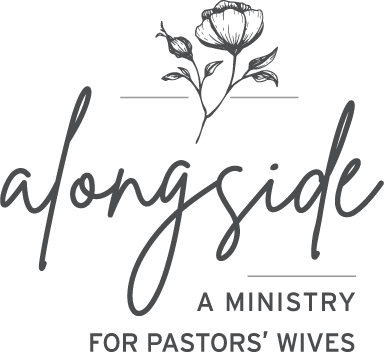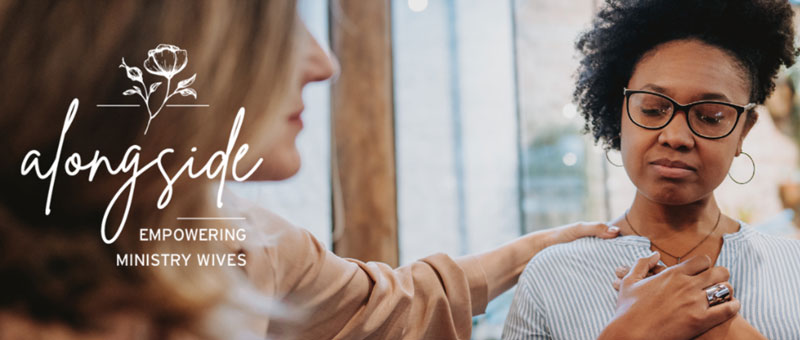Finding friends as a pastor’s wife..how could this short phrase be such a layered subject?
Perhaps you have asked some of the same questions we have:
- Should I have friends inside or outside the church?
- How can I trust again after I have been hurt?
- What if my friend leaves our church…can we stay friends? What if I leave?
- How do I know if someone has the strength to be my friend?
- What are some ideas to find friendships outside the church?
The Writers’ Team at Alongside knew that to dive into this complicated topic, we’d need friends! So we linked arms and decided to dive into these questions together. We hope you enjoy the kaleidoscope of answers as much as we did!
Q: Do I need friends inside or outside the church?
Karen – Before I was a pastor’s wife, all of my friends were outside the church. After a few years of being a PW, all of my friends were inside of the church. Neither of these extremes on the pendulum is healthy. Balance is the key here, as we really do need both. If all of your friends are outside of the church, then fellowship within our church can be superficial and relationships fall flat. If all of our friends are inside of the church, then our identity potentially becomes wrapped up in relationships within the church. We need balance, trusted friends that are in both places who understand the dynamics of being a PW.
Coletta – I’ve swung to extremes here too. I’ve had to adjust my expectations and realize that God puts different friends in my life to meet different needs. One friend can’t meet them all. I have friends inside the church that can meet my need for laughter, fun, comradery. I have to be careful about what weighty things I share with them because it puts them in a difficult position, likely carrying weight they weren’t asked to carry. I’ve realized that having a few friends outside my church, that are pastors’ wives also, provides three things that others cannot: safety, stability, and strength. They aren’t safe just because they keep my secrets. They are safe because they aren’t shocked or thrown off balance when I struggle with doubt, rough emotions or relationships that are causing damage. They are stable because they aren’t going to exit my life when they don’t like a decision my husband has made. And finally, they have the strength I need because God has made them gutsy and gritty, with the chops it takes to walk with me through deep waters.
Julie Lynn – I can be more open with friends outside the church, but I think friendships inside the church are important to invest in too. It can be tempting to pass on relationships inside the church for my protection or because my expectations aren’t being met. Friendships inside the church can provide a space to discuss spiritual things that we are learning together as a community. There are needs and projects inside the church body that friendships inside the church can work together to meet.
Q: How do I trust after being betrayed or hurt?
Karen – Trusting after being hurt is a process. Our temptation is to guard our heart and lock it away so that it can never be hurt again. But shutting down is not a healthy place to be, and bitterness can become a stronghold in our lives. Acknowledge the hurt and loss, and allow yourself to grieve. But don’t stay there. Ask God for new perspectives, new beginnings, and new relationships. Take it one step at a time, one day at a time. Find your identity in Christ and who HE says that you are.
Julie Lynn – Pray (you cannot do this in your own strength), give yourself a LOT of grace, and just keep showing up. My road back to trying to trust again was paved with baby steps and a lot of grace. I would challenge myself to stay a little longer after the service or arrive a few minutes earlier to give space for conversations and relationships to grow again. I did not let people inside the church dictate how fast this process should be for me. I can tell you it is worth the emotional work. God designed us for community and friendship.
Q: Can you stay friends when they leave the church?
Karen – Yes and No. Every relationship is unique, and friendship is a two way street. Both parties must have the desire to continue the friendship. Communication is key, and it is always preferable to meet in person if possible. Did you know your friend(s) were leaving the church? How did they tell you that they were leaving, or did they just “ghost” you? Acknowledge hurts and offenses if it applies to your situation. Talk about expectations, and how to move forward. Will the friendship continue as it was before and you meet with them for coffee every week? Or is your friendship different now? Can you still send each other texts when you think about them? How will you react to seeing each other when you are at events with mutual friends (weddings, funerals, etc.), or when you see each other out and about in the community? If both parties want to continue the friendship, then that is a truly wonderful gift. But if there has been hurt that has changed the dynamic of the friendship, then take the opportunity to acknowledge the hurt, apologize, ask for forgiveness, offer grace and forgiveness, and wish them well. If at all possible, be at peace with them. Your paths may cross again.
Coletta – Theoretically, yes. Practically, most of the time, it’ll change. You may still be friends but you won’t be “doing life together.” And practically, we only have so many relationship slots. God is always moving people in and out of our lives and we have to steward those slots so that we are investing in those that God is calling us to. I had to adjust to the idea that when someone leaves, I am “out of sight, out of mind.” Release them and allow the friendship to wane, celebrating what God did through them for the season that I got to be close. I’ve discovered a way to say goodbye to friends when I know they are leaving (when they don’t just vanish). I write out some of the ways I’ve seen God use them in my life, ways I’ve seen them grow, and hopes that I have for what God will do in the future. Just a little card with some phrases on it, hitting these areas. I take them for coffee and take a few minutes to speak these hope-filled truths over them. It makes what could be an awkward (or even confrontational and defensive interaction) into one that celebrates what GOD has done. And there is something powerful in hearing what God has done through you spoken over you. Then I pray a blessing over them. Sometimes it’s necessary to coach them and lower the anxiety level at the beginning by simply saying, “I know you and your family have decided to find another church home. I don’t really want to get into the why of that decision. But instead, I would like to spend a few minutes reminding you of what God has done through you and our friendship.” This may not seem quite “authentic”. But it is intentional and it makes your last interaction one that glorifies God.
Q: Can you stay friends after you leave a church?
Angela – It is possible, but this dynamic is a bit more complicated as you want to give time for each individual in the congregation, including your friends, to be able to attach to their new pastor. This is where the relationship becomes more about what is best for them and not for you.
- Begin with honest conversation. While they may not fully understand, explain that you love them deeply and want what is best for them. Space between you doesn’t mean you don’t care but that you are giving them a gift to discover the new pastor family and new season with freedom.
- Allow for space. This provides a way for either closure or if possible, a new relationship to develop between you. Time will likely reveal what is needed.
- Take it slow. You are creating a new bond and relationship that can look entirely different. Don’t have the same expectations of the relationship as it once was.
- Find another source to talk with about your pain and grief. Healthy relationship can build to that overtime, but while it is fresh and raw, it’s important to leave those conversations for someone outside of the situation rather than your friend who is likely processing through their own grief as well.
Q: How do you test the waters to see if someone is trustworthy?
Julie Lynn – I can “test” by sharing information that is not confidential/sensitive. If that information makes it back to me quickly from another source, then this is likely not a person I can share the depths of my heart with. It is a delicate balance between being open to friendships and being savvy/wise due to the nature of the confidential information we hold.
Coletta – I listen to how they talk about others. How much do they like to be seen as “in the know?” Do they share with me information about others that is sensitive? Are they easily overwhelmed or have a high need to “vent”? There is no substitute for time here – and take baby steps.
Q: How do I know if they have the strength to be my friend?
Coletta – They understand how to prioritize crisis. In this life, we have seasons where we go from one crisis to the next. She needs to have the ability to see when my tank is truly running low and when this is just “life as usual.” I test the waters. If I let her into a struggle I’m dealing with and it seems to weigh on her and upset her, or if she wants to take up arms and fight a battle and I have to talk her down, she’s not someone that can handle being my confidant. A strong woman is able to actively listen and help me gain perspective. An insecure woman will try to fix and make suggestions before she understands, trying to meet her own need to bring value and answers. A strong friend is reflective enough to bring hard-won wisdom but also humble enough to understand the complexity and weight of what I carry.
Julie Lynn – Over the years I have learned it is a SMALL circle of those who are true friends. Traits I value are: regular communication, willingness to challenge me and discuss spiritual things, awareness of what is close to my heart, thoughtfulness to ASK questions, initiating get-togethers, and an “all-in” presence (meaning.. not “half listening” and looking at a buzzing watch while we are meeting). Part of growth is learning to “flip the lens” on this and take an inward look to see if I am this kind of friend to others.
Q: What are my “out of the box” options for a friendship if I don’t find her within my church?
Karen – After two decades in ministry, I am finding myself looking for friendships that don’t revolve around church or ministry. In the past, I have allowed myself to be completely consumed by ministry, and it was not healthy for me. As I am walking out of some past hurt I find myself longing for someone to truly know ME, and not my role. I live in a rural area, so I am learning to venture into other surrounding communities to find and build relationships. And I must confess, I rarely tell people that I am a PW when I first meet them. Here are a few out of the box options that I have either tried or are on my list of things to try: book clubs, paint nights, running/walking groups, Bumble (online app) for friendships, food tours, trivia/chess/checkers/puzzles game nights, Bunco night, social media groups that are interest-specific, PW friends/groups that have a “no church talk” policy, art museums tours.
Julie Lynn – Volunteering in your community. This spring I joined a community chorus (which was SUPER fun and I met a fellow soprano to talk to) and now I am investigating a local food bank volunteering option. Challenge yourself not to give up on finding friends. Take the next step. Send the e-mail or the text to inquire and just see what happens.
**ALONGSIDE COHORTS! You will find an incredible group of pastor’s wives inside our cohorts. We, as coaches, DELIGHT when friendships formed in the cohort go OUTSIDE the cohort. So if you have been in one..please reach out and invite another pastor’s wife to Zoom with you! This matters so much!**
Q: What do you do when you are the only initiator? Take people to coffee over and over and never have anyone reciprocate?
Angela – I have learned for my own emotional well-being to set boundaries so that I am not taken advantage of and do not stay in wondering for too long. I’ve developed a “3 attempts” limit, meaning I will be the one to initiate on 3 separate occasions. Then, I will place the responsibility in their lap, sometimes using wording such as: “I would enjoy getting together with you. You let me know if that is of interest to you and when it works best for your schedule.” Then I release them. Sometimes I find they do come back on their own to invite me. Other times, I find the door closed and it frees me to move on.
Julie Lynn – I’m still working through this as an uber-planner/initiator. It delights me when someone else puts effort into initiating, but I am learning not to immediately expect this out of others. I do use emotional intelligence and do not keep initiating if I can see the other person is not interested in spending time together. A couple “signs” I watch for: consistently making excuses why they cannot meet or canceling at the last minute. If I see a pattern of those signs, it is an indicator that they are not ready to invest in a friendship and it is my cue to give them space. A pastor friend gave some good perspective on this topic. He discovered a lot of the people inside his church always assumed he was busy, so they rarely asked him or his wife to do anything fun. This did help explain some of the silence and indicated to me that especially inside the church, I may have to do a lot of the initiating.
If you are feeling alone/without friendships, we hope the answers to these questions have helped to spark some ideas and offer some starting points. As always, we at Alongside are here to help. You can reach out to us through our website and we would love to get a coach in contact with you. Pastor’s wife’s road is NOT an easy life…but it is a special one and you don’t have to travel it alone! We are here to cheer you on in your journey and help connect you with “fellow travelers.” Don’t give up..the effort you invest in cultivating friendships matters. (Hugs and fist bumps). We love you.



